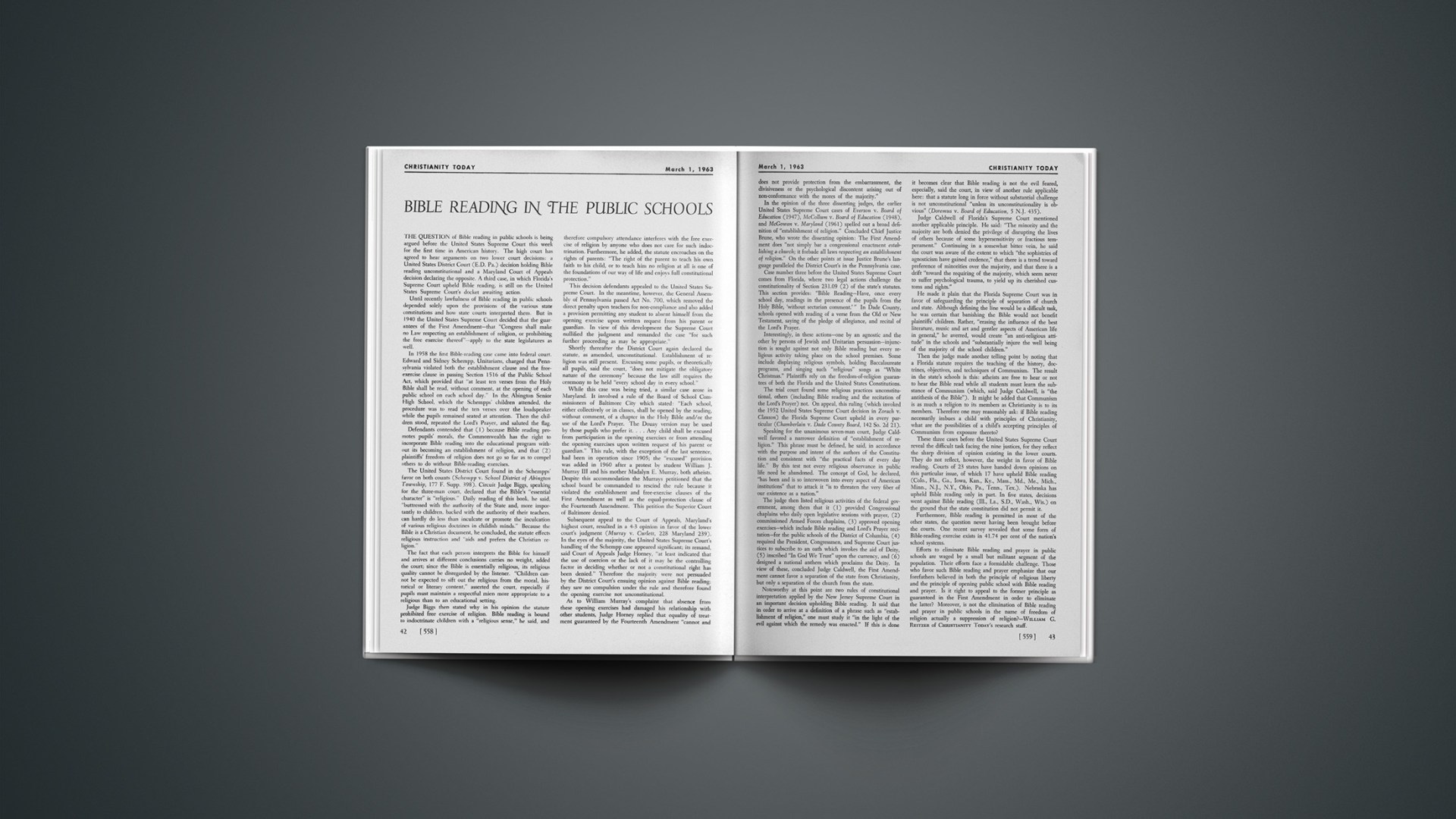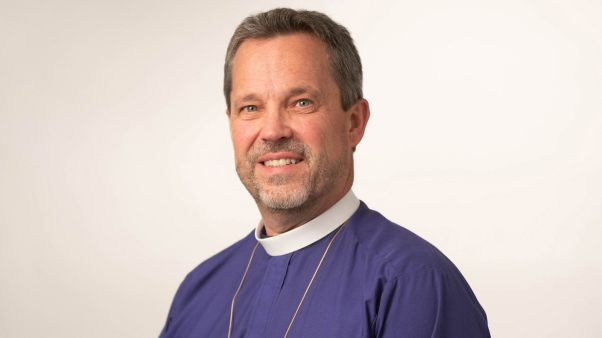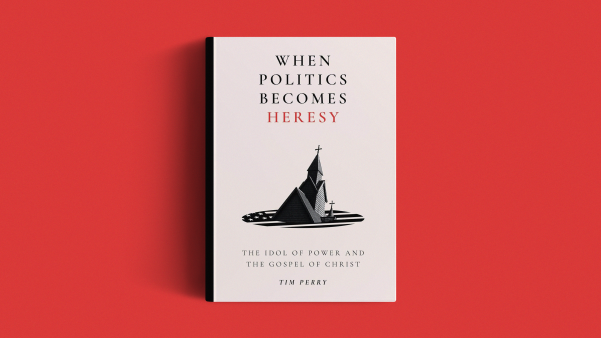The Question of Bible reading in public schools is being argued before the United States Supreme Court this week for the first time in American history. The high court has agreed to hear arguments on two lower court decisions: a United States District Court (E.D. Pa.) decision holding Bible reading unconstitutional and a Maryland Court of Appeals decision declaring the opposite. A third case, in which Florida’s Supreme Court upheld Bible reading, is still on the United States Supreme Court’s docket awaiting action.
Until recently lawfulness of Bible reading in public schools depended solely upon the provisions of the various state constitutions and how state courts interpreted them. But in 1940 the United States Supreme Court decided that the guarantees of the First Amendment—that “Congress shall make no Law respecting an establishment of religion, or prohibiting the free exercise thereof”—apply to the state legislatures as well.
In 1958 the first Bible-reading case came into federal court. Edward and Sidney Schempp, Unitarians, charged that Pennsylvania violated both the establishment clause and the free-exercise clause in passing Section 1516 of the Public School Act, which provided that “at least ten verses from the Holy Bible shall be read, without comment, at the opening of each public school on each school day.” In the Abington Senior High School, which the Schempps’ children attended, the procedure was to read the ten verses over the loudspeaker while the pupils remained seated at attention. Then the children stood, repeated the Lord’s Prayer, and saluted the flag.
Defendants contended that (1) because Bible reading promotes pupils’ morals, the Commonwealth has the right to incorporate Bible reading into the educational program without its becoming an establishment of religion, and that (2) plaintiffs’ freedom of religion does not go so far as to compel others to do without Bible-reading exercises.
The United States District Court found in the Schempps’ favor on both counts (Schempp v. School District of Abington Township, 177 F. Supp. 398). Circuit Judge Biggs, speaking for the three-man court, declared that the Bible’s “essential character” is “religious.” Daily reading of this book, he said, “buttressed with the authority of the State and, more importantly to children, backed with the authority of their teachers, can hardly do less than inculcate or promote the inculcation of various religious doctrines in childish minds.” Because the Bible is a Christian document, he concluded, the statute effects religious instruction and “aids and prefers the Christian religion.”
The fact that each person interprets the Bible for himself and arrives at different conclusions carries no weight, added the court; since the Bible is essentially religious, its religious quality cannot be disregarded by the listener. “Children cannot be expected to sift out the religious from the moral, historical or literary content,” asserted the court, especially if pupils must maintain a respectful mien more appropriate to a religious than to an educational setting.
Judge Biggs then stated why in his opinion the statute prohibited free exercise of religion. Bible reading is bound to indoctrinate children with a “religious sense,” he said, and therefore compulsory attendance interferes with the free exercise of religion by anyone who does not care for such indoctrination. Furthermore, he added, the statute encroaches on the rights of parents: “The right of the parent to teach his own faith to his child, or to teach him no religion at all is one of the foundations of our way of life and enjoys full constitutional protection.”
This decision defendants appealed to the United States Supreme Court. In the meantime, however, the General Assembly of Pennsylvania passed Act No. 700, which removed the direct penalty upon teachers for non-compliance and also added a provision permitting any student to absent himself from the opening exercise upon written request from his parent or guardian. In view of this development the Supreme Court nullified the judgment and remanded the case “for such further proceeding as may be appropriate.”
Shortly thereafter the District Court again declared the statute, as amended, unconstitutional. Establishment of religion was still present. Excusing some pupils, or theoretically all pupils, said the court, “does not mitigate the obligatory nature of the ceremony” because the law still requires the ceremony to be held “every school day in every school.”
While this case was being tried, a similar case arose in Maryland. It involved a rule of the Board of School Commissioners of Baltimore City which stated: “Each school, either collectively or in classes, shall be opened by the reading, without comment, of a chapter in the Holy Bible and/or the use of the Lord’s Prayer. The Douay version may be used by those pupils who prefer it.… Any child shall be excused from participation in the opening exercises or from attending the opening exercises upon written request of his parent or guardian.” This rule, with the exception of the last sentence, had been in operation since 1905; the “excused” provision was added in 1960 after a protest by student William J. Murray III and his mother Madalyn E. Murray, both atheists. Despite this accommodation the Murrays petitioned that the school board be commanded to rescind the rule because it violated the establishment and free-exercise clauses of the First Amendment as well as the equal-protection clause of the Fourteenth Amendment. This petition the Superior Court of Baltimore denied.
Subsequent appeal to the Court of Appeals, Maryland’s highest court, resulted in a 4–3 opinion in favor of the lower court’s judgment (Murray v. Curlett, 228 Maryland 239). In the eyes of the majority, the United States Supreme Court’s handling of the Schempp case appeared significant; its remand, said Court of Appeals Judge Horney, “at least indicated that the use of coercion or the lack of it may be the controlling factor in deciding whether or not a constitutional right has been denied.” Therefore the majority were not persuaded by the District Court’s ensuing opinion against Bible reading; they saw no compulsion under the rule and therefore found the opening exercise not unconstitutional.
As to William Murray’s complaint that absence from these opening exercises had damaged his relationship with other students, Judge Horney replied that equality of treatment guaranteed by the Fourteenth Amendment “cannot and does not provide protection from the embarrassment, the divisiveness or the psychological discontent arising out of non-conformance with the mores of the majority.”
In the opinion of the three dissenting judges, the earlier United States Supreme Court cases of Everson v. Board of Education (1947), McCollum v. Board of Education (1948), and McGowan v. Maryland (1961) spelled out a broad definition of “establishment of religion.” Concluded Chief Justice Brune, who wrote the dissenting opinion: The First Amendment does “not simply bar a congressional enactment establishing a church; it forbade all laws respecting an establishment of religion.” On the other points at issue Justice Brune’s language paralleled the District Court’s in the Pennsylvania case.
Case number three before the United States Supreme Court comes from Florida, where two legal actions challenge the constitutionality of Section 231.09 (2) of the state’s statutes. This section provides: “Bible Reading—Have, once every school day, readings in the presence of the pupils from the Holy Bible, ‘without sectarian comment.’ ” In Dade County, schools opened with reading of a verse from the Old or New Testament, saying of the pledge of allegiance, and recital of the Lord’s Prayer.
Interestingly, in these actions—one by an agnostic and the other by persons of Jewish and Unitarian persuasion—injunction is sought against not only Bible reading but every religious activity taking place on the school premises. Some include displaying religious symbols, holding Baccalaureate programs, and singing such “religious” songs as “White Christmas.” Plaintiffs rely on the freedom-of-religion guarantees of both the Florida and the United States Constitutions.
The trial court found some religious practices unconstitutional, others (including Bible reading and the recitation of the Lord’s Prayer) not. On appeal, this ruling (which invoked the 1952 United States Supreme Court decision in Zorach v. Clauson) the Florida Supreme Court upheld in every particular (Chamberlain v. Dade County Board, 142 So. 2d 21).
Speaking for the unanimous seven-man court, Judge Caldwell favored a narrower definition of “establishment of religion.” This phrase must be defined, he said, in accordance with the purpose and intent of the authors of the Constitution and consistent with “the practical facts of every day life.” By this test not every religious observance in public life need be abandoned. The concept of God, he declared, “has been and is so interwoven into every aspect of American institutions” that to attack it “is to threaten the very fiber of our existence as a nation.”
The judge then listed religious activities of the federal government, among them that it (1) provided Congressional chaplains who daily open legislative sessions with prayer, (2) commissioned Armed Forces chaplains, (3) approved opening exercises—which include Bible reading and Lord’s Prayer recitation—for the public schools of the District of Columbia, (4) required the President, Congressmen, and Supreme Court justices to subscribe to an oath which invokes the aid of Deity, (5) inscribed “In God We Trust” upon the currency, and (6) designed a national anthem which proclaims the Deity. In view of these, concluded Judge Caldwell, the First Amendment cannot favor a separation of the state from Christianity, but only a separation of the church from the state.
Noteworthy at this point are two rules of constitutional interpretation applied by the New Jersey Supreme Court in an important decision upholding Bible reading. It said that in order to arrive at a definition of a phrase such as “establishment of religion,” one must study it “in the light of the evil against which the remedy was enacted.” If this is done it becomes clear that Bible reading is not the evil feared, especially, said the court, in view of another rule applicable here: that a statute long in force without substantial challenge is not unconstitutional “unless its unconstitutionality is obvious” (Doremus v. Board of Education, 5 N.J. 435).
Judge Caldwell of Florida’s Supreme Court mentioned another applicable principle. He said: “The minority and the majority are both denied the privilege of disrupting the lives of others because of some hypersensitivity or fractious temperament.” Continuing in a somewhat bitter vein, he said the court was aware of the extent to which “the sophistries of agnosticism have gained credence,” that there is a trend toward preference of minorities over the majority, and that there is a drift “toward the requiring of the majority, which seem never to suffer psychological trauma, to yield up its cherished customs and rights.”
He made it plain that the Florida Supreme Court was in favor of safeguarding the principle of separation of church and state. Although defining the line would be a difficult task, he was certain that banishing the Bible would not benefit plaintiffs’ children. Rather, “erasing the influence of the best literature, music and art and gentler aspects of American life in general,” he averred, would create “an anti-religious attitude” in the schools and “substantially injure the well being of the majority of the school children.”
Then the judge made another telling point by noting that a Florida statute requires the teaching of the history, doctrines, objectives, and techniques of Communism. The result in the state’s schools is this: atheists are free to hear or not to hear the Bible read while all students must learn the substance of Communism (which, said Judge Caldwell, is “the antithesis of the Bible”). It might be added that Communism is as much a religion to its members as Christianity is to its members. Therefore one may reasonably ask: if Bible reading necessarily imbues a child with principles of Christianity, what are the possibilities of a child’s accepting principles of Communism from exposure thereto?
These three cases before the United States Supreme Court reveal the difficult task facing the nine justices, for they reflect the sharp division of opinion existing in the lower courts. They do not reflect, however, the weight in favor of Bible reading. Courts of 23 states have handed down opinions on this particular issue, of which 17 have upheld Bible reading (Colo., Fla., Ga., Iowa, Kan., Ky., Mass., Md., Me., Mich., Minn., N.J., N.Y., Ohio, Pa., Tenn., Tex.). Nebraska has upheld Bible reading only in part. In five states, decisions went against Bible reading (Ill., La., S.D., Wash., Wis.) on the ground that the state constitution did not permit it.
Furthermore, Bible reading is permitted in most of the other states, the question never having been brought before the courts. One recent survey revealed that some form of Bible-reading exercise exists in 41.74 per cent of the nation’s school systems.
Efforts to eliminate Bible reading and prayer in public schools are waged by a small but militant segment of the population. Their efforts face a formidable challenge. Those who favor such Bible reading and prayer emphasize that our forefathers believed in both the principle of religious liberty and the principle of opening public school with Bible reading and prayer. Is it right to appeal to the former principle as guaranteed in the First Amendment in order to eliminate the latter? Moreover, is not the elimination of Bible reading and prayer in public schools in the name of freedom of religion actually a suppression of religion?—WILLIAM G. REITZER of CHRISTIANITY TODAY’S research staff.










